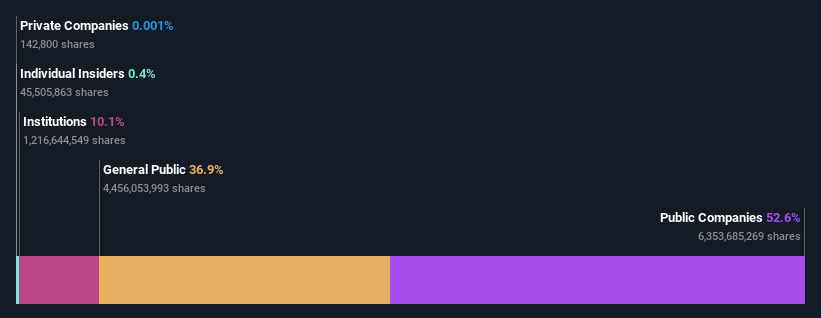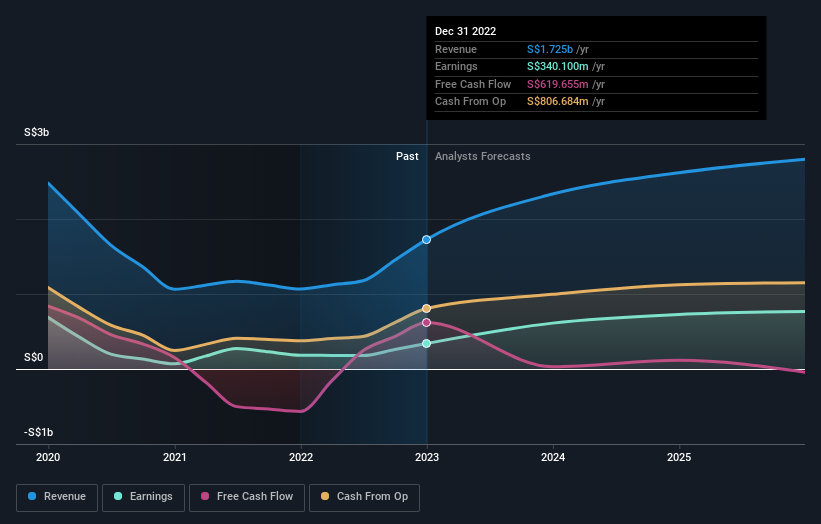Genting Singapore Limited's (SGX:G13) largest shareholders are public companies who were rewarded as market cap surged S$362m last week
Key Insights
Genting Singapore's significant public companies ownership suggests that the key decisions are influenced by shareholders from the larger public
The largest shareholder of the company is Genting Berhad with a 53% stake
If you want to know who really controls Genting Singapore Limited (SGX:G13), then you'll have to look at the makeup of its share registry. The group holding the most number of shares in the company, around 53% to be precise, is public companies. Put another way, the group faces the maximum upside potential (or downside risk).
Clearly, public companies benefitted the most after the company's market cap rose by S$362m last week.
In the chart below, we zoom in on the different ownership groups of Genting Singapore.
See our latest analysis for Genting Singapore
What Does The Institutional Ownership Tell Us About Genting Singapore?
Institutional investors commonly compare their own returns to the returns of a commonly followed index. So they generally do consider buying larger companies that are included in the relevant benchmark index.
We can see that Genting Singapore does have institutional investors; and they hold a good portion of the company's stock. This implies the analysts working for those institutions have looked at the stock and they like it. But just like anyone else, they could be wrong. If multiple institutions change their view on a stock at the same time, you could see the share price drop fast. It's therefore worth looking at Genting Singapore's earnings history below. Of course, the future is what really matters.
We note that hedge funds don't have a meaningful investment in Genting Singapore. Genting Berhad is currently the company's largest shareholder with 53% of shares outstanding. With such a huge stake in the ownership, we infer that they have significant control of the future of the company. The Vanguard Group, Inc. is the second largest shareholder owning 1.8% of common stock, and BlackRock, Inc. holds about 1.6% of the company stock.
While it makes sense to study institutional ownership data for a company, it also makes sense to study analyst sentiments to know which way the wind is blowing. There are a reasonable number of analysts covering the stock, so it might be useful to find out their aggregate view on the future.
Insider Ownership Of Genting Singapore
While the precise definition of an insider can be subjective, almost everyone considers board members to be insiders. Company management run the business, but the CEO will answer to the board, even if he or she is a member of it.
Insider ownership is positive when it signals leadership are thinking like the true owners of the company. However, high insider ownership can also give immense power to a small group within the company. This can be negative in some circumstances.
Our data suggests that insiders own under 1% of Genting Singapore Limited in their own names. As it is a large company, we'd only expect insiders to own a small percentage of it. But it's worth noting that they own S$44m worth of shares. It is always good to see at least some insider ownership, but it might be worth checking if those insiders have been selling.
General Public Ownership
The general public, who are usually individual investors, hold a 37% stake in Genting Singapore. While this group can't necessarily call the shots, it can certainly have a real influence on how the company is run.
Public Company Ownership
We can see that public companies hold 53% of the Genting Singapore shares on issue. We can't be certain but it is quite possible this is a strategic stake. The businesses may be similar, or work together.
Next Steps:
It's always worth thinking about the different groups who own shares in a company. But to understand Genting Singapore better, we need to consider many other factors. Be aware that Genting Singapore is showing 1 warning sign in our investment analysis , you should know about...
Ultimately the future is most important. You can access this free report on analyst forecasts for the company.
NB: Figures in this article are calculated using data from the last twelve months, which refer to the 12-month period ending on the last date of the month the financial statement is dated. This may not be consistent with full year annual report figures.
Have feedback on this article? Concerned about the content? Get in touch with us directly. Alternatively, email editorial-team (at) simplywallst.com.
This article by Simply Wall St is general in nature. We provide commentary based on historical data and analyst forecasts only using an unbiased methodology and our articles are not intended to be financial advice. It does not constitute a recommendation to buy or sell any stock, and does not take account of your objectives, or your financial situation. We aim to bring you long-term focused analysis driven by fundamental data. Note that our analysis may not factor in the latest price-sensitive company announcements or qualitative material. Simply Wall St has no position in any stocks mentioned.
Join A Paid User Research Session
You’ll receive a US$30 Amazon Gift card for 1 hour of your time while helping us build better investing tools for the individual investors like yourself. Sign up here


